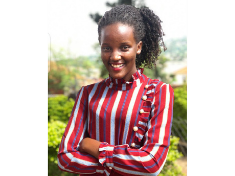-
Vanessa Nakate on Giving Weight to the Voices of Those Most Affected by Climate Change
December 11, 2020 By Matthew Gallagher “We need to give more weight to the voices of people who are most affected by climate change,” says Vanessa Nakate, a prominent Ugandan climate activist, in this week’s Friday Podcast. At the local, regional, and global levels, Nakate’s work sheds light on the imperative for policymakers to value the lived experiences of oft-overlooked groups such as women, youths, and citizens of developing nations. “When I talk about climate justice, it is not something that I want for the future—it is something that I want right now, because our present is catastrophic,” she says.
“We need to give more weight to the voices of people who are most affected by climate change,” says Vanessa Nakate, a prominent Ugandan climate activist, in this week’s Friday Podcast. At the local, regional, and global levels, Nakate’s work sheds light on the imperative for policymakers to value the lived experiences of oft-overlooked groups such as women, youths, and citizens of developing nations. “When I talk about climate justice, it is not something that I want for the future—it is something that I want right now, because our present is catastrophic,” she says.“We need to give more weight to the voices of people who are most affected by climate change,” says Vanessa Nakate, a prominent Ugandan climate activist, in this week’s Friday Podcast. At the local, regional, and global levels, Nakate’s work sheds light on the imperative for policymakers to value the lived experiences of oft-overlooked groups such as women, youths, and citizens of developing nations. “When I talk about climate justice, it is not something that I want for the future—it is something that I want right now, because our present is catastrophic,” she says.
Nakate began her journey as an activist in 2018. With a desire to catalyze the betterment of her community and country, she investigated people’s needs and determined that climate insecurity presents a fundamental challenge. “Everything I was seeing in the news—in regard to the landslides, to the floods, to the droughts in my country—they had a connection with climate change.”
Uganda relies heavily on agriculture to support livelihoods, putting the country on the front lines of climate change. “The changing weather patterns are a danger to us because they are causing shorter and heavier rain seasons, and longer and hotter dry spells,” says Nakate. Beyond the threat of economic and food insecurity, uneven rainfall presents a public safety risk. Nakate says that the water levels can submerge people’s homes, farms, and businesses. “It’s quite dangerous to walk in the middle of the city after a heavy downpour because you could step in a ditch and the next time they see you, you’re already gone,” she says.
Nakate led her first climate strike in early 2019. “We are doing everything we can to hold governments accountable and to demand climate justice,” says Nakate. Part of her message is urging political leaders to divest from fossil fuels and to combat corporate pollution. “Around one hundred corporations are responsible for 71 percent of global emissions,” she says. “We should move from just talking about how badly they are destroying our home, our planet, to actually holding them accountable.” In pursuit of this accountability, Nakate spoke of the need to prosecute ecocide in international courts, describing environmental destruction as a crime against humanity, ecosystems, the present, and the future.
In addition to championing climate justice in the international arena, Nakate is working to build resilience for local communities. In 2019, she started a project installing solar panels and clean cooking stoves in education facilities. “I wanted to drive a transition to renewable energy, especially in rural schools,” says Nakate, adding that energy inaccessibility and food insecurity hinder the learning process. “The students have to eat, no one can study on an empty stomach.”
Friday Podcasts are also available for download on iTunes and Google Podcasts.
Photo Credit: Photo of Vanessa Nakate, courtesy of Paul Wamala Ssegujja.
Sources: adelphi, BBC, Natural Resources Defense Council, New Agriculturalist, UN, Wilson Center
 A Publication of the Stimson Center.
A Publication of the Stimson Center.

 “We need to give more weight to the voices of people who are most affected by climate change,” says Vanessa Nakate, a prominent Ugandan climate activist, in this week’s Friday Podcast. At the local, regional, and global levels, Nakate’s work sheds light on the imperative for policymakers to value the lived experiences of oft-overlooked groups such as women, youths, and citizens of developing nations. “
“We need to give more weight to the voices of people who are most affected by climate change,” says Vanessa Nakate, a prominent Ugandan climate activist, in this week’s Friday Podcast. At the local, regional, and global levels, Nakate’s work sheds light on the imperative for policymakers to value the lived experiences of oft-overlooked groups such as women, youths, and citizens of developing nations. “

